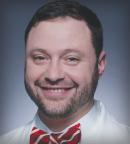The ASCO Post spoke with Alexander Melamed, MD, MPH, a gynecologic oncologist and Assistant Professor of Obstetrics & Gynecology at NewYork-Presbyterian/Columbia University Medical Center, New York, at the onset of the COVID-19 pandemic in New York.
New York state has had more coronavirus cases than any country in the world. What has been the biggest impact at your institution?
There are two ways in which we are being impacted. First, resources have become scarce because the health system is not built for this. The hospital is having to divert a huge amount of resources to save people’s lives who are very sick from COVID-19. Operating rooms have been turned into intensive care units, and many surgical personnel have been redeployed. Second, every time you bring a patient into contact with the health-care system, you’re risking an infection.

Alexander Melamed, MD, MPH
Are there certain guidelines you’re following right now, or are you going on a case-by-case basis and by the health of the individual patient?
The Society of Gynecologic Oncology (SGO) has been an important resource. SGO has put on webinars and released statements about treating patients with gynecologic cancers in COVID-19–burdened regions. Within my department, we have convened to determine what conditions can wait and what conditions cannot. We’ve tried to figure out reasonable standards of care under these extraordinary circumstances.
What keeps you up at night?
The colleagues I worry about most are those who have and care for older parents. My parents are across the country. I worry about getting my wife sick, but she’s also a gynecologic oncologist, so she might get me sick, too. I have a daughter, and you always worry about your kids. There are doctors in ICUs in New York who are fighting for their lives, so it’s concerning. But this may be a special opportunity to be a doctor in a way that you’re not always asked to be.
DISCLOSURE: Dr. Melamed reported no conflicts of interest.
EDITOR'S NOTE: This was excerpted from a longer interview. Visit http://bit.ly/Melemed for the full interview.

